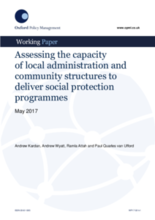Abstract
Overview
With the expansion of social protection programmes and services and emergence of nascent social protection systems in Sub-Saharan Africa, greater attention is being paid to the capacity of these systems to deliver. In a number of these countries, there is greater reliance on local government structures in management and delivery of these programmes. Moreover, these local administrative units, in turn, depend heavily on voluntary community structures to support delivery of these programmes. Taking a pragmatic and problem driven approach, this paper focuses on the performance of these local and community-based structures in delivering the social protection systems that they are tasked to support. It draws in particular on evidence from assessments carried out Zambia and Kenya, which seek to answer how well the systems are performing and assess the capacity of existing structures to deliver cash transfer and other social protection programmes in accordance with their original design.
Methodology
The paper utilises a multi-dimensional approach to capacity assessment to underpin its data collection and lens through which data is interpreted and analysed. The framework looks at capacity across institutional (e.g. laws, regulations, procedural requirements), organisational and individual dimensions. It also frames capacity within a temporal dimension that distinguishes between the actions needed to create or acquire capacity (in its various aspects), to put it to use in the organisations, and then to ensure that it is not lost. The study utilised a mixed methods approach for data collection, drawing on review of documents and the literature, key informant interviews at national and subnational level and questionnaire survey with government staff at national and sub-national levels.
Findings
The emergence of social protection programmes and, in particular, cash transfers has resulted in the reallocation of district staff time away from statutory functions (e.g. social care services, case management and referral), with increasing time spent delivering the cash transfer programmes. The local governments deliver these programmes under strained staffing structures and with very limited critical material resources (e.g. office space, vehicles, computers, etc.). While the level of range of qualifications is quite high amongst professional staff, the nature of their work has substantially changed from their traditional social welfare role, requiring higher levels of project management skills and leadership skills than their formal education has prepared them for.
Greater linkages between community and local government structures is required; however, this is often hampered by a lack of institutional clarity at the national level around roles, responsibility and mandate that is cascaded downwards to the local government and right through to the multiple, and often overlapping, community structures supporting different vertical programmes.
Great demands are placed on local voluntary structures in delivery of these programmes underpinned by the ethos of community-driven development. The absence of material and financial support, adequate training or meaningful linkages with local government structures puts into question the sustainability of such community-based systems as an effective and sustainable delivery model.

